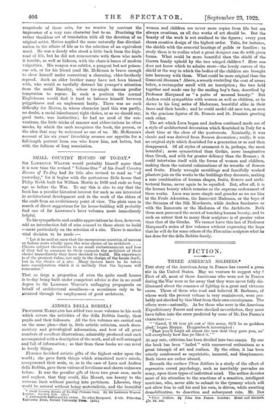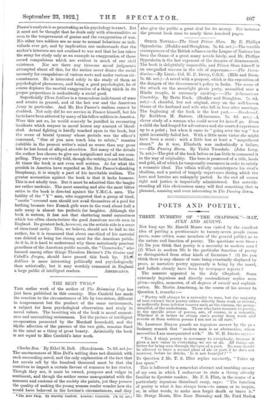FICTION.
THREE AMERICAN SOLDIERS.* THIS story of the American Army in France has caused a gre.aro stir in the United States. May we venture to suggest why ? First of all, most of those Americans who were not in France during the War were so far away that they were never fully dis- illusioned about the romance of fighting in a great and virtuous cause. Those of them who read and believed M. Barbusse, of whose work the present volume is very reminiscent, were pro-
bably not shocked by this blast from their own countryman. The others were—naturally. As for those who were in the American
Expeditionary Forces and were shocked nevertheless, they must have fallen into the error predicted by some of Mr. Dos Passos's characters :—
" Gawd, if Oi iver git out o' this army, be so goddara glad,' began Happy. Hoggenback interrupted :
That you'll forgit all about the raw deal they gave you, an' tell everybody how fine ye liked it.'"
At any rate, criticism has been divided into two camps. By one
the book has been " hailed " with unreserved enthusiasm as a great triumph of art and realism. By the other, it has been utterly condemned as unpatriotic, immoral, and blasphemous.
Both views are rather absurd.
Beneath the surface Three Soldiers is a study of the effect of repressive crowd psychology, such as inevitably pervades an army, upon three types of individual mind. The author devotes most of his attention to the reactions of a sensitive, intelligent
musician, who, never able to submit to the tyranny which will. not allow him to call his soul his own, is driven, while awaiting demobilization, to desertion and subsequent ruin. Mr. Dos
Andrea deU Robbia and his Atelier. By Allan Marquand. 2 vols. Princeton • Three Soldiers. By John Dos Passes. London : Hurst and Blackett.
Passos's analysis is as penetrating as his psychology is exact. But it must not be thought that he deals only with abnormalities as seen in the temperament of genius and the exaggeration of war. His other two soldiers are as near to normal behaviour as indi- viduals ever get, and by implication one understands that the author's interests are not confined to war and that he has taken the army for study only as an example in exaggeration of those crowd compulsions which are evident in much of our civil existence. Nor are there any tiresome moral judgments attempted about all this, for the author never denies the social necessity for compulsions of various sorts and under various cir- cumstances. He is interested solely in the study of them as psychological phenomena, and being a good psychologist, he of course deplores the morbid exaggeration of a thing w.hich in its proper proportions is undoubtedly a social good.
Superficially Three Soldiers is a tremendous indictment of wars and armies in general, and of the last war and the American Army in particular. And Mr. Dos Passos's realism cannot be doubted. Not only did he see service in France himself, but his facts have been attested by many of his fellow soldiers in America. Were this not so, he would scarcely be justified in recounting incidents which surpass in moral horror any amount of blood- shed. Actual fighting is hardly touched upon in the book, but the scene of brutal tyranny whose prelude was the officer's command, "One of you men teach him to salute," remains indelible in the present writer's mind as worse than any gross tale he has heard of alleged atrocities. Not many of the details the author has chosen to give are insignificant and all are com- pelling. They are vividly told, though the writing is not brilliant. At times the book is not even well written. As for what the prudish in America have regarded as Mr. Dos Passos's shocking blasphemy, it is simply a part of his inevitable realism. The greater accusation against the book is that it lacks humour. This is not wholly true. But it must be admitted that the laughs are rather sardonic. The most amusing and also the most bitter satire in the book is directed against the Y.M.C.A. men. The futility of the " Y " man, who suggested that a group of tired, "cootie "-covered men should not avail themselves of a pool for bathing because two French girls were in the road about half a mile away is almost too pathetic for laughter. Although the book is serious, it has not that shattering moral earnestness which too often characterizes the good American novels seen in England. Its greatest lack, however, on the artistic side is a sense of structural unity. This, we believe, should not be laid to the author, for it is rumoured that about one-third of his material was deleted as being too strong meat for the American public. As it is, it is hard to understand why those notoriously prurient guardians of the American public morals, the " Comstocks," who banned among other things Theodore Dreiser's The Genius and Cabell's Jurgen, should have passed this book by. The Soldiers is more interesting politically and psychologically than artistically, but it may worthily command in England



































 Previous page
Previous page